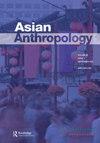Rural emplacements: linking heterotopia, one health and ikigai in central Hokkaido
Q2 Social Sciences
引用次数: 2
Abstract
Abstract For over fifteen years the author has conducted fieldwork in a rural area of central Hokkaido. During that time the linkage between individualistic notions of life’s meaning, wellness and location or environment have been popular conversation topics among a wide array of interlocutors both native and newcomer. This article briefly outlines three distinct theoretical strands—heterotopia, specifically its concern with emplacement; the One Health paradigm, notably the importance of more-than-human effects and affects; and ikigai, often translated as what gives life meaning. It then disembeds these frames from their common limits and contextual moorings in urban studies and art interpretation, public and veterinary health, and Japanese studies respectively, in order to weave them together via ethnographic biographies that open for comparison concerns regarding health and well-being that vary yet collectively sustain the motivation, sometimes fleeting and often liminal, to remain in rural Japan农村安置:连接北海道中部的异托邦、一种健康和ikigai
作者在北海道中部的农村地区进行了超过15年的田野调查。在那段时间里,个人主义对生活意义、健康和地点或环境的看法之间的联系一直是广泛的对话者之间的热门话题,无论是本地人还是新来的人。本文简要概述了三种不同的理论:异托邦,特别是它对定位的关注;“同一个健康”范式,特别是超越人类的影响和影响的重要性;ikigai通常被翻译成赋予生命意义的东西。然后,它将这些框架分别从城市研究和艺术解释,公共和兽医健康以及日本研究的共同限制和语境中分离出来,以便通过民族志传记将它们编织在一起,这些传记开放供比较,关注不同的健康和福祉,但共同维持动机,有时是短暂的,通常是有限的,留在日本农村
本文章由计算机程序翻译,如有差异,请以英文原文为准。
求助全文
约1分钟内获得全文
求助全文
来源期刊

Asian anthropology
Social Sciences-Anthropology
CiteScore
1.60
自引率
0.00%
发文量
25
期刊介绍:
Asian Anthropology seeks to bring interesting and exciting new anthropological research on Asia to a global audience. Until recently, anthropologists writing on a range of Asian topics in English but seeking a global audience have had to depend largely on Western-based journals to publish their works. Given the increasing number of indigenous anthropologists and anthropologists based in Asia, as well as the increasing interest in Asia among anthropologists everywhere, it is important to have an anthropology journal that is refereed on a global basis but that is editorially Asian-based. Asian Anthropology is editorially based in Hong Kong, Taiwan, and Japan, but welcomes contributions from anthropologists and anthropology-related scholars throughout the world with an interest in Asia, especially East Asia as well as Southeast and South Asia. While the language of the journal is English, we also seek original works translated into English, which will facilitate greater participation and scholarly exchange. The journal will provide a forum for anthropologists working on Asia, in the broadest sense of the term "Asia". We seek your general support through submissions, subscriptions, and comments.
 求助内容:
求助内容: 应助结果提醒方式:
应助结果提醒方式:


